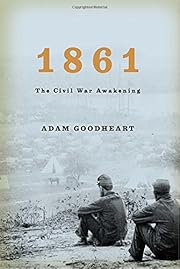

Click on a thumbnail to go to Google Books.
|
Loading... 1861: The Civil War Awakeningby Adam Goodheart
 No current Talk conversations about this book.   ) )Last month I started reading "Storm Over the Land," by Carl Sandburg, and realized I didn't remember enough about the actual events of the Civil War -- not the general gist but the specific timeline -- to enjoy Sandburg's lyrical, poetic account, billed as "a profile of the Civil War." It glances at many events, or makes quick references to people, and I knew I was missing out because I didn't really know what those events and people were, aside from generally knowing they were Civil War-y. (It's like reading Thomas Carlisle on the French Revolution, which he wrote while events were still so fresh in everyone's minds that he could namedrop.) So I took some advice from Lisa Bu's TED Talk, and found a second book to pair with it. And so far, "1861" is everything I wanted. It contains lots of facts, a good plain explanation of events, but it's also beautifully written and surprising on every page. What I can't get enough of, what just continually blows my mind, is how desperate the South was (and some of the North) to keep slavery alive. In the book, I'm just to the point of the Crittenden Compromise and the proposed Corwin amendment to the constitution. It's astonishing to think as a country how close we were to not only preserving but encouraging human slavery, and what "1861" does well is help you see how truly not-that-long-ago that happened, and how very like us the people were who almost pulled it off. It's amazing to think we have photographs, not woodcuts or paintings but photos, of people who advocated for human slavery on the floor of the US Congress. Góð yfirferð um aðdraganda og upphaf þrælastríðsins í BNA. Vel skrifuð og rannsökuð og Goodheart fjallar ítarlega um félagsleg áhrif einstakra atburða á samfélagið í Norðurríkjunum. Ekki oft sem maður fær slíka innsýn í söguna en um leið afhjúpar þetta helsta galla bókarinnar að mínu mati. Á sama tíma og hún er kynnt sem sagan um aðdraganda borgarastríðsins þá fjallar hún eingöngu um norðurríkin og hvernig samfélagið sameinaðist á bak við forsetann í því að berjast gegn Suðurríkunum. An excellent book. Well written, reads like a novel, documented thoroughly and adds fresh comment from the author's tapestry of perspective. Quotes used in the book would support progressive views on extant issues. Our President, cabinet and congressional officers should read this book, if they have not done so. Will we ever learn from history? Adam Goodheart's series of vignettes covering various stories of mostly "supporting" actors in the drama of 1861 from the aftermath of Lincoln's election up to the Battle of Bull Run is well executed and was a pleasure to read. Each chapter could stand on its own but covers every section of the country, blacks as well as whites, women as well men, and of course Northerners of various political opinions and Southerners including some notorious fire-eaters. Without going into detail about each chapter I will only call out the fact that the first people who were "woke" in our history were apparently the self-described "Wide Awakes", a collection of white males who originated in Hartford, CT and spread throughout the North to advocate for resistance to the "slave power". When you read this book and you should read it, don't skip the PostScript.
150 years after the surrender of Fort Sumter, the journalist, travel writer and historian Adam Goodheart has let loose his own salvo in what will be a four-year firestorm of books commemorating the Civil War. Many good studies about the struggle will be published, but few will be as exhilarating as “1861: The Civil War Awakening.” "Slated for release in conjunction with the sesquicentennial of the Battle of Fort Sumter, 1861 is essential reading for those who wish to learn more about the Civil War’s crucial first months." AwardsDistinctions
As the United States marks the 150th anniversary of our defining national drama, historian Adam Goodheart presents an original account of how the Civil War began. 1861 is an epic of courage and heroism beyond the battlefields. Early in that fateful year, a second American revolution unfolded, inspiring a new generation to reject their parents' faith in compromise and appeasement, to do the unthinkable in the name of an ideal. It set Abraham Lincoln on the path to greatness and millions of slaves on the road to freedom. Goodheart takes us from the corridors of the White House to the slums of Manhattan, from the mouth of the Chesapeake to the deserts of Nevada, from Boston Common to Alcatraz Island, vividly evoking the Union at this moment of ultimate crisis and decision.--From publisher description. No library descriptions found. |
Current DiscussionsNonePopular covers
 Google Books — Loading... Google Books — Loading...GenresMelvil Decimal System (DDC)973.711History & geography History of North America United States Administration of Abraham Lincoln, 1861-1865 Civil War Political history; causes, results CausesLC ClassificationRatingAverage: (4.16) (4.16)
Is this you?Become a LibraryThing Author. |
|||||||||||||||||||||||||||||||||||||||||||||||||||||||||||||||||||||||||||||||||||||||||||||||||||||||||||||||||||||||||||